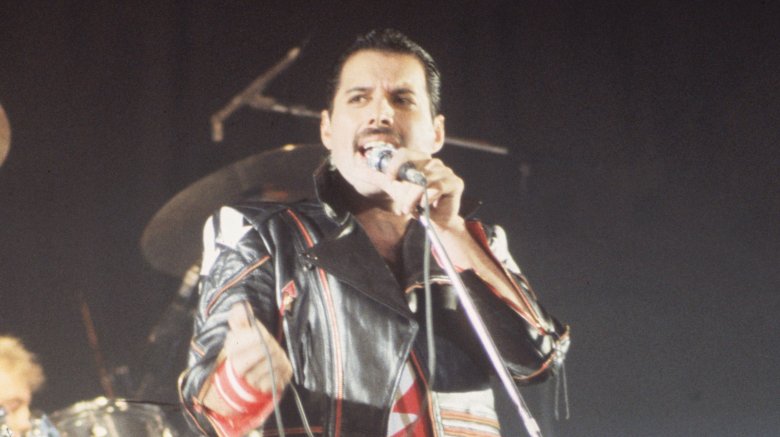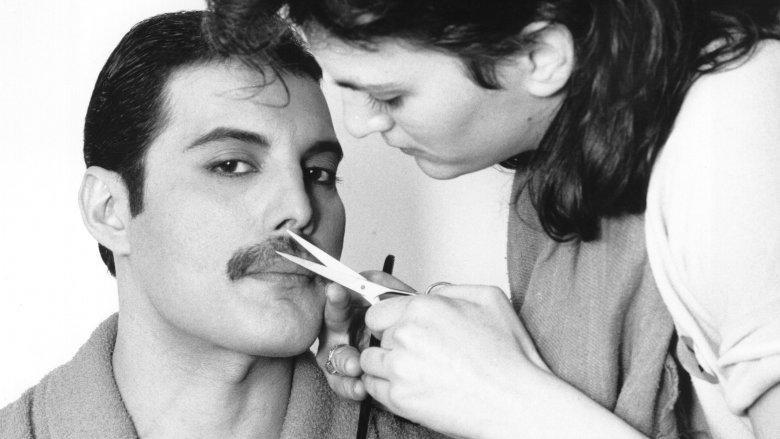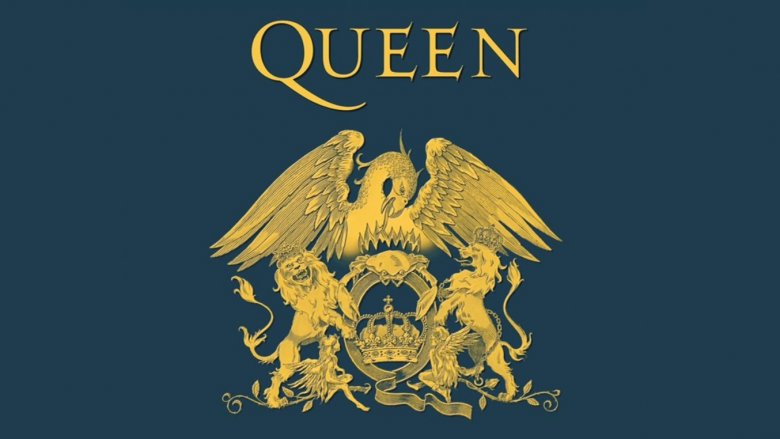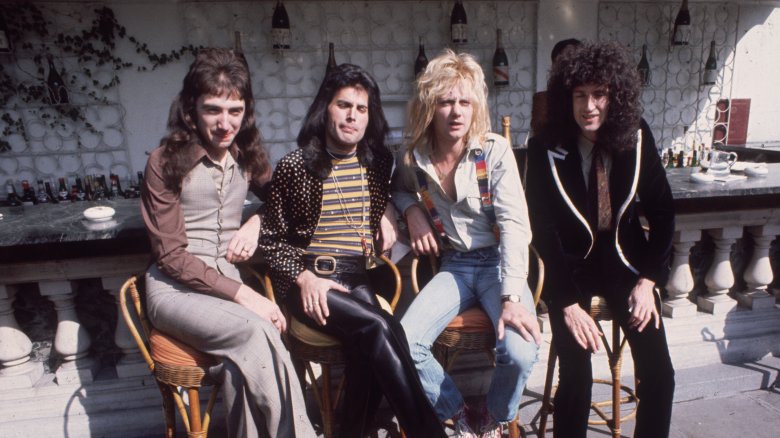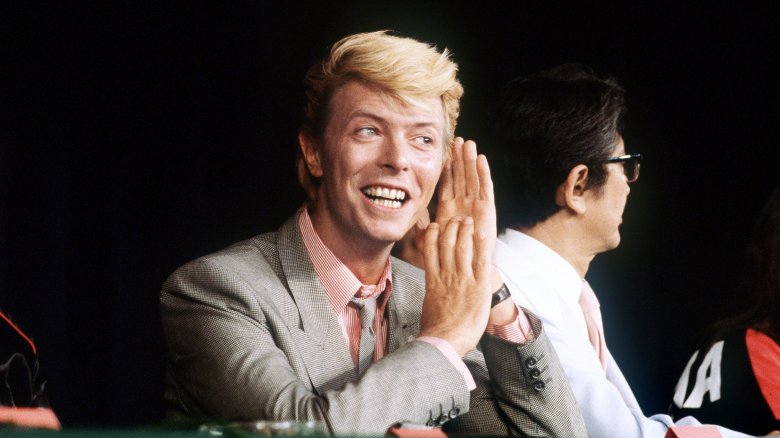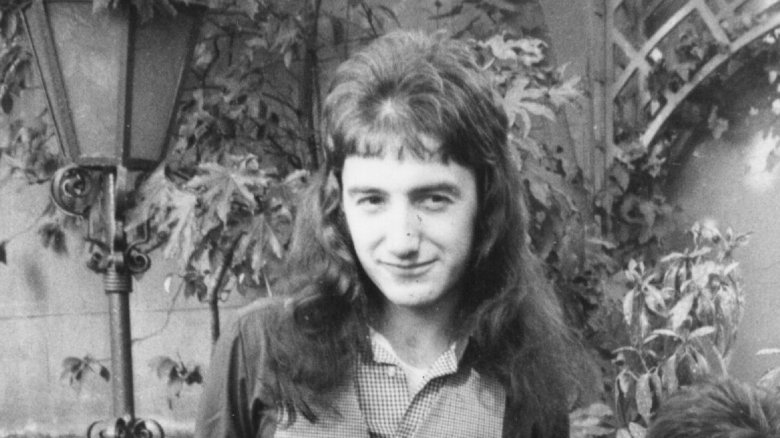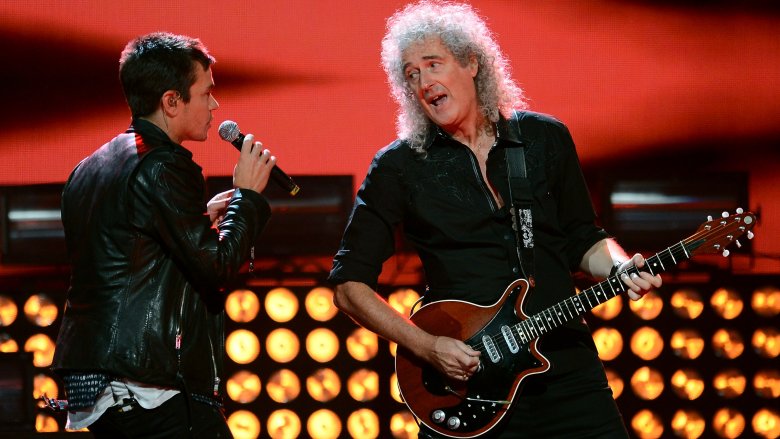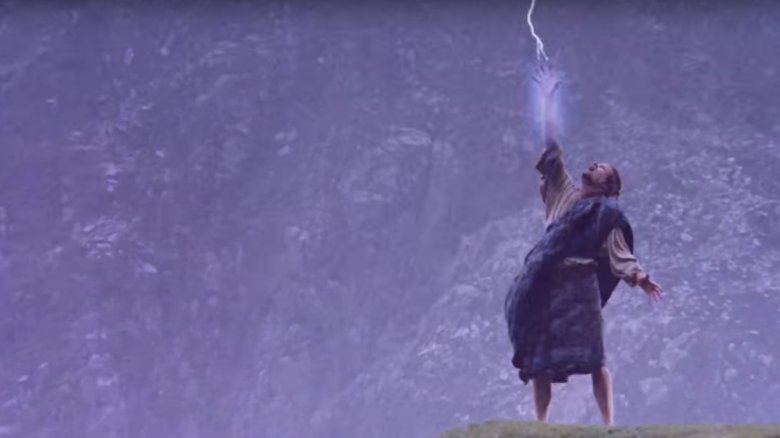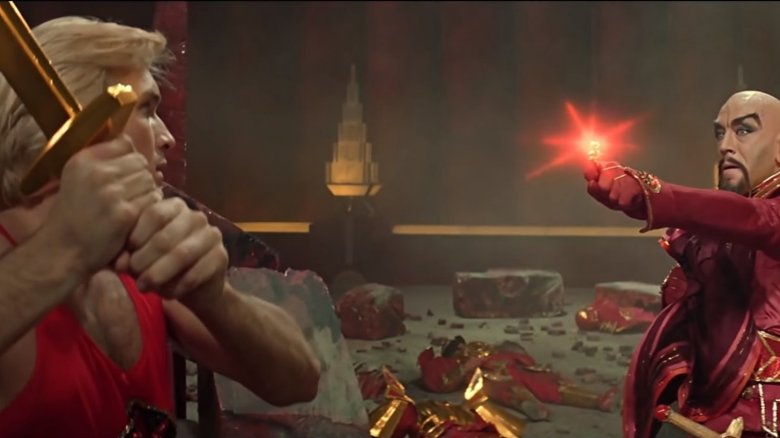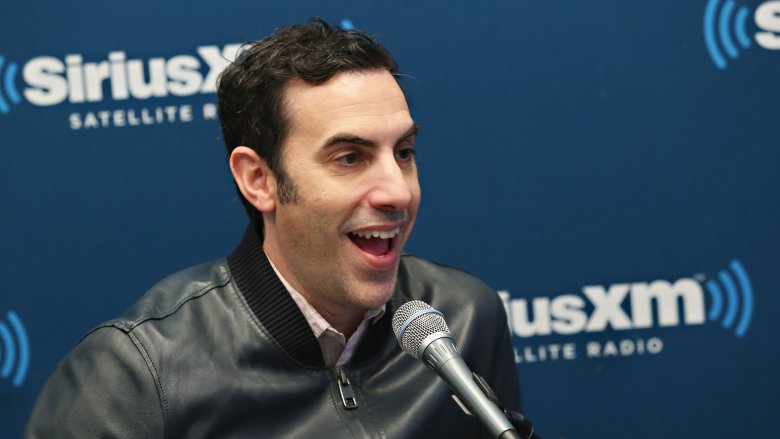The Untold Truth Of Queen
Queen is one of those bands that can be easy to overlook. It's not that they're unnoticeable, it's that they're too noticeable. They're omnipresent. They're everywhere. They're a city skyline that you just sort of take for granted because you can't remember a time when they weren't taking up all of your peripheral vision. That sort of ubiquity can make people forget that there's a story inside the constant. Most people wouldn't ask how a mountain got there, they'd just be content knowing it existed. Same goes for "We Will Rock You."
It should come as no surprise that the story of Queen is one of innovation, drama, and fabulousness. The faces behind some of the catchiest songs of the last century belong to almost shockingly complex human beings with accomplishments that would have made them remarkable even if they hadn't been the dudes behind "Brighton Rock." What follows is a look at the drama, transformation, and surprising amount of science that went into making Queen.
Farrokh me
Brace yourself: There aren't a lot of people who would name their kid Freddie Mercury. Rock and roll monikers are generally grown into like school shoes, not handed to you tailor made. Imagine if someone was born with a name like Jimmy Starshine or Billy Sagittarius and then grew up to be a dog walker or a podiatrist or something. It'd be embarrassing.
Shocking though it might be, Freddie Mercury wasn't the given name of the front man of Queen.
He was actually born into a devout Zoroastrian family to parents from India. His birth name? Farrokh Bulsara. He was born in Zanzibar (now Tanzania for those keeping score at home) and spent a good chunk of his childhood at a private school in India, where he started going by Freddie. He didn't change his last name to Mercury until around the time he helped form Queen. You have to admit, it rolls off the tongue a little easier and probably saved the band months of time in interviewers asking about the pronunciation.
The Royal Crest
Band logos can be a tricky thing. Everyone's seen a poster for a local metal show with a pile of unreadable lettering spelling out the names of the groups playing. It's a thin line between an eye-catching symbol and a nonsense eyesore, so how do you make sure you land on the right side of album art history? Well, it helps if the guy doing your design work is one of the most iconic rock stars in history.
Yeah, it wasn't enough for Freddie Mercury to perform on some of the best-selling, most revered songs of all time. He also designed the band's crest, incorporating the astrological signs of all of the band's members: two Leos for Roger Taylor and John Deacon, a Cancer crab for Brian May, and two fairies symbolizing Mercury's Virgo. If you're curious, you can see Mercury's original sketch of the design on the back side of the group's first album.
We'll never be royals
It's rare for monarchs to be born directly to the throne. Even Elizabeth II came from humble beginnings as plain old Princess Elizabeth Alexandra Mary. The point is, there's a process of transformation that must take place before a regent fulfills his or her destiny.
Case in point: Queen wasn't always Queen. In their pupal state, the band was called Smile, and it consisted of future Queen members Brian May and Roger Taylor, as well as front man Tim Staffell. If you haven't heard of Staffell, there's a good reason. He left the group in 1970 to join another band, the delightfully named Humpy Bog.
Humpy Bog only lasted a year, but the remains of Smile stayed together, despite having only recorded six songs up to that point. They kept trucking at the behest of a fan who changed their name to Queen and became their new lead singer. That fan was Freddie Mercury. Pow. What a twist.
Feeling the pressure
"Under Pressure" was the result of a combination of David Bowie, cocaine, and failure. Put bluntly, it was the '80s.
Here's the scene: In July 1981, Bowie had come into the studio to record backup vocals for a Queen song called "Cool Cat." You know, "Cool Cat." You might remember "Cool Cat" from, well, nothing. It didn't go anywhere. The song was scrapped. No matter what they tried, they just couldn't get it to work, so they did what anyone would do in that situation: a bunch of wine and cocaine.
As the evening progressed, nose candy- and booze-fueled creativity took hold. Queen and Bowie started messing around with a completely different song, a number by Queen's drummer Roger Taylor, tentatively titled "Feel Like." In a burst of era-specific creative hedonism, the song metamorphosed into something amazing. The bass line came together, the duet was improvised, and "Under Pressure" was born.
Brian May isn't a star
Brian May isn't a star, but he is an asteroid. Stick with us here.
Brian May isn't necessarily a household name, but you'd be hard pressed to find someone who isn't familiar with his work. As the guitarist for Queen, he wrote "Brighton Rock," "Fat Bottomed Girls," and "We Will Rock You." That would be more than enough accomplishment for most people, but May just kept on going.
See, May had dropped out of college back in the '70s to pursue a career in music. It panned out all right for him, but he decided to go back to school more than 30 years later and wrap up his doctoral thesis in astrophysics. He finished in one year, which is pretty impressive after a three-decade hiatus. He's also worked with NASA on projects most of us would feel stupid reading about and had an asteroid named after him in 2008. All of this might seem incongruous with May's rock and roll lifestyle, but it fits pretty perfectly with his bonkers Doctor Who hairdo.
John Deacon is amped
Queen's bassist, John Deacon, has been a lot of things in his life. For example, on Queen's first album, he wasn't even himself. He was credited as Deacon John because the other band members thought it sounded more interesting. Show biz is weird.
More importantly, John Deacon is a professionally trained electronics engineer, and without him, Queen wouldn't sound the way it does. Sure, he wrote "You're My Best Friend" and "Another One Bites the Dust," but at a much more literal level, he invented the band's trademark sound. Deacon was the creator of the legendary Deacy Amp, the sound system that gave Queen their almost orchestral tones. It's a piece of equipment that enthusiasts and engineers spent years trying to replicate, with limited success. It wasn't until 2008 when engineers tore the original machine apart that they managed to find some semblance of an understanding of its inner workings. The most impressive part? Deacon made it out of some pieces of broken stuff he found.
The Red Special
There are a few legendary guitars in music history. Gene Simmons' axe bass, for example, and Eddie Van Halen's Frankenstrat. But none of them have an origin story as unique as Brian May's Red Special guitar.
If there's a song by Queen that you love, chances are you've loved listening to the Red Special playing it. The Red Special is a custom piece built by Brian and his father back in the '60s, and it's the instrument he's used for nearly all his work with Queen. According to May, it was made of stuff they had around the house: The wood for the panel came from a table, the neck is made out of a piece of an old fireplace. Oh, also? Neither May nor his father had ever made a guitar before. They just sort of pulled music history out of their hats on the first go.
What's more interesting is it was a unique instrument at the time of its conception. He couldn't afford to buy a guitar, but even if he had, nobody was building what Brian wanted, which was a guitar that created feedback by design. It was a novel concept at the time, and it's exactly what the Red Special was designed to do, with the help of May's father's electrical engineering background. Rock and roll.
Weird inspirations
Trench coats. Decapitations. Stunt swords attached to car batteries so they'd make sparks when they hit each other. Truly, Highlander was a work of genius.
If you haven't seen Highlander, it's an unusual brand of pure '80s concentrate. It's the story of a race of immortals who spend a few centuries cutting each other's heads off until there's only one left alive. The winner gets hit by lightning. The only man in Scotland with a Scottish accent is Sean Connery, who is playing an Egyptian. It's an epic on the same scale as Ulysses or those Old Spice commercials. All it needed was an equally brilliant soundtrack. If only there were a band with the cartoonishly overinflated charisma to match the movie's in no way ridiculous tone.
Enter Queen, who said those three perfect words: "No, thank you."
For real, the band initially turned down the opportunity to write songs for Highlander, but changed their minds after seeing a 20-minute cut of footage from the film. Brian May claimed he was so moved by the story of an immortal falling in love with a woman who would grow old and die that he immediately wrote "Who Wants To Live Forever." Freddie Mercury wrote "Princes of the Universe," Roger Taylor penned "It's A Kind of Magic," and the world was an objectively better place for it.
Flash in the pan
No one here will debate the undeniable fact that Flash Gordon is a masterwork of cinematic artistry, in large part because there's no comments section to argue in.
Flash Gordon is an empirically goofy movie. What's the goofiest part of Flash Gordon, you ask? It's not the army of husky gentlemen with big, rubbery bird wings on their backs, all talking like John Rhys-Davies from Lord of the Rings 20 years early. It's not the honestly, truly agonizing green screen work. It's not even the part where you can see the light physically leaving Max von Sydow's eyes as he patiently waits for the check to clear. No, the goofiest, weirdest part of Flash Gordon is Queen's theme song to Flash Gordon.
For the uninitiated, the song goes "Flash, whoa-oh," and that pretty much sums it up. Queen's minimalistic lyrics could be a result of the fact that they were releasing an album and prepping for a tour when they decided to add the Flash Gordon soundtrack to their to-do list. Or it could just be that it's hard to write a song lauding the accomplishments of a space warrior-slash-football star while keeping a straight face. Either way, the song was a number one hit, and it stayed on the charts for 10 weeks ... in Austria.
C-Lebrity
With all of the glamour, fame, and international jet-fueled sybaritism, you might very well wonder why the story of Queen hasn't been turned into a movie. The answer? They've been trying for almost a decade, and one is finally here.
It's been a long road to getting a Queen movie made. The first shot at one was announced in 2010, with Sacha Baron Cohen attached to play Freddie Mercury. Three years later, and with nothing filmed, Cohen left the project. He cited a number of reasons for exiting the film, with the big one being creative differences with the surviving members of the band. While Cohen had wanted to make a gritty, adult-oriented look at the life and death of Freddie Mercury, Brian May and Roger Taylor instead wanted a more family-friendly vibe, with half the movie focused on how Queen had kept going after Mercury's death.
From there, the project continued to hit speed bumps. It burned through more actors and directors before landing (as of this writing) on Rami Malek to play Mercury and Bryan Singer Dexter Fletcher to direct. Bohemian Rhapsody releases November 2, 2018.
Greatest of all time
Everyone has slow days at work, with the apparent exception of whoever's selling Queen's Greatest Hits in the United Kingdom.
In Neil Gaiman and Terry Pratchett's best-selling 1990 novel Good Omens, it is posited that any cassette tape left in a car for more than a couple weeks at a time will, without explanation, transform into a copy of Queen's Greatest Hits. If nothing else, that would help explain some of the following numbers. Released in 1981, Greatest Hits is exactly what it sounds like: a compilation album with all the band's most popular songs. It's also, by a pretty wide margin, the all-time best-selling album in the U.K. and the first album ever to sell over 6 million copies there, beating the next runner-up (either Sgt. Pepper's Lonely Hearts Club Band or ABBA Gold, it's neck and neck) by almost a million copies. It's spent more than 800 weeks on the U.K. charts.
